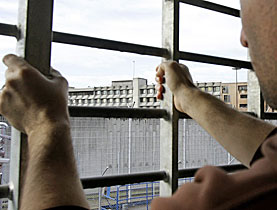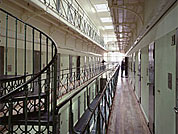Parliament comes down hard on foreign criminals

Swiss voters will be asked to decide in a nationwide ballot on two proposals to expel foreign criminals, parliament has agreed.
Parliamentarians on Thursday approved a counterproposal that watered down an initiative brought by the rightwing Swiss People’s Party on automatically deporting any foreigner convicted of a serious crime.
After a long and heated debate, a majority in parliament decided to give voters an alternative to the People’s Party initiative “for the expulsion of foreigners who commit crimes”. They recommended that voters reject the initiative and accept the counterproposal instead.
The counterproposal offers a more specific list of expulsion crimes than the People’s Party’s version.
It also sets down that deportations should respect the Swiss constitution and international law.
The People’s Party was the only party to defend its initiative, which it launched in 2007 as a keystone of its electoral campaign of that year. Its use of a controversial poster, showing white sheep booting out a black sheep, caused controversy both in Switzerland and abroad.
That initiative called for the automatic expulsion of foreigners convicted of serious crimes, such as rape and murder. It also included welfare fraud. Currently deportation is not mandatory.
Supporters collected more than 211,000 signatures in favour of the move – double the amount needed.
Parliamentary misgivings
Parliament and the government subsequently declared the intiative valid, despite many members expressing misgivings. It was decided that it did not violate compulsory international law, although questions were raised over whether it went against non-compulsory international law and the Swiss constitution.
Centre-right Christian Democrat Urs Schwaller was among those who pointed out that parliament could not simply ignore a text which had collected so many signatures.
But centre-left Social Democrat Ada Marra called on parliament to show courage and “react against this democratic terrorism”.
Dick Marty, from the centre-right Radical Party, spoke of tricking the population: “Do we respect people’s rights and let them believe today that this initiative is valid, only to tell them tomorrow that it isn’t, or do we tell them the truth today?”
He underlined how there had been application problems with two other initiatives: the one of 2004 on locking up violent criminals and sex offenders for life and the one of November 29 last year against the construction of minarets in Switzerland.
Minaret initiative
It was following the outcome of the minaret initiative that the Senate asked for a re-examination of the foreign criminals text and for the drawing up of a direct counterproposal (involving a change to the constitution) rather than keeping to an indirect counterproposal as proposed by the government (involving a change to the law).
In this way, parliamentarians argued, the public would have two options as only the direct counterproposal would automatically come to a vote.
With the counterproposal the parliamentary majority hoped to block the People’s Party at the polls, even though some had to accept the counterproposal through gritted teeth.
“It is necessary to choose the lesser of two evils,” said Social Democrat Maria Roth-Bernasconi.
Disagreements
Nevertheless, parliamentarians had to agree to a concession to secure the support of the Social Democrats – namely the introduction to the constitution of an article on integration. The aim of this, argued the Social Democrats, was to prevent crime committed by foreigners.
The counterproposal failed to impress the People’s Party, who argued that the current law and especially its application was too lax and did not act as a deterrent. Time and again, the party faithful denounced foreign criminals as a problem for the country.
Whereas their text would result in the current 300-400 expulsions a year rising by a factor of five, the counterproposal would hardly change anything, argued Walter Wobmann.
While this figure is disputed, it is clear that the foreigners’ law will become tougher, whichever proposal gets through at the ballot box.
Changing the constitution needs both a double majority of the electorate and the cantons. Voters will also be asked an extra question: which of the two texts should be accepted if both are approved.
The campaign for the hearts and minds of the population should be a heated one.
Sonia Fenazzi, swissinfo.ch (Adapted from Italian by Isobel Leybold-Johnson)
If parliament recognises a people’s initiative as valid, but does not totally agree with what it proposes, it can put forward a counterproposal.
This can be direct,
which involves a constitutional change. In a nationwide vote it needs a double majority of the population and cantons to be accepted.
The initiative and counterproposal are submitted at the same time to a vote, with the addition of a supplementary question. This asks which of the two people would prefer should both texts obtain a double majority.
Parliament can also opt for an indirect counterproposal which is regulated at the legislative level i.e. as a law. If approved the law enters into force. It can be subject to a nationwide vote if a referendum (needing 50,000 signatures) is successfully launched against it by a group or party.
It only needs a simple majority of votes to be accepted at the ballot box.
The initiative – launched by a committee of the rightwing Swiss People’s Party – aims at the automatic deportation of foreigners convicted of serious crimes such as murder, rape, other serious sexual charges, violence such as armed robbery, drug trafficking, human trafficking, and breaking and entering. Welfare fraud is also included.
The counterproposal has tightened the list to (among others): premeditated murder, murder, rape, aggravated armed robbery, and a serious violation of the drug law. Grievous bodily harm was added in by the House of Representatives.
Swiss citizens can force a nationwide vote on an amendment to the constitution by collecting at least 100,000 signatures within 18 months.
Most proposals failed to win a majority at the ballot box in the 118-year history of people’s initiatives.
Four – out of 169 people’s initiatives put to a vote so far – were declared invalid by parliament since 1891.

In compliance with the JTI standards
More: SWI swissinfo.ch certified by the Journalism Trust Initiative







You can find an overview of ongoing debates with our journalists here. Please join us!
If you want to start a conversation about a topic raised in this article or want to report factual errors, email us at english@swissinfo.ch.